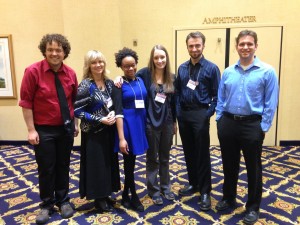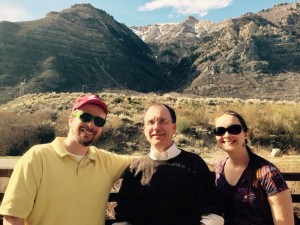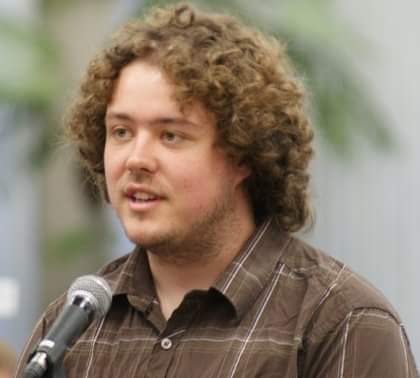There were a number of excellent talks at the (deep breath) American Psychological Association Division 36 Society for the Psychology of Religion and Spirituality 2015 Mid-Year Conference hosted by Brigham Young University (BYU) at the Marriott Conference Center in Provo, Utah, United States on March 20th and 21st (exhale). In particular, the second keynote address by Dr. Frank Fincham, Director of the Florida State University Family Institute was an excellent model of how research in the psychology of religion and spirituality can have practical use in designing psychological interventions in addition to the acquisition of knowledge. His and his collaborators’ work involved the psychological impacts of partner-directed prayer on the romantic relationships of religious believers, specifically how prayer can bolster relationship quality by increasing the forgiveness ability of the praying partner. Over a series of carefully framed studies he described the process they used to look at the broad effects of partner directed prayer on relationships. After narrowing their focus, they found that increased cooperative behavior was the primary mediator of the effect of prayer on forgiveness. They used these findings to construct and validate a prayer-focused marriage therapy intervention within an African-American, religious population. Throughout his talk, he was careful to make it clear that these studies were done with, and only apply to, religious believers and that the possibility of comparable mechanisms for nonbeliever couples still need to be researched.

At least for my part, this was greatly appreciated. As someone who studies religious nonbelievers (not to mention being one), it can chafe reading or watching a presentation on research which has broadly sweeping conclusions about the benefits of religious belief which go far beyond what the data allow. Often this research implicitly (sometimes explicitly) assumes that the audience is religious themselves and that the research can be generalized to nonbelievers by just flipping the direction of the results. It was refreshing to have religious-oriented research presented in a manner that both framed the results within the context of the beliefs of the people who participated in the research and explicitly acknowledged that the conclusions drawn could not be applied to nonbelievers without further study.
Dr. Fincham’s focus on measurable psychological mechanisms contrasted sharply with the major themes from symposium presented by a number of scholars from BYU the previous day. The presenters answered the title of the symposium, chaired by Shannon Starks, “Does Psychology’s Naturalism Hamper Understanding of Religious Phenomena?” with a resounding “Yes!” Ms. Starks spoke first and her presentation outlined how widely used introductory psychology texts take a strictly naturalistic stance and often reject supernatural hypotheses for psychological phenomena just as resoundingly. Dr. Jeffery S. Reber presented the second talk and gave a number of examples of psychological theories that grew out of the work of famous theologians. However, when the writers most responsible for bringing these theories into psychology (sometimes the theologian themself!) translated them, all references to a god/gods, the divine, or the supernatural were removed.

The third talk, presented by Dr. Edwinn E. Gantt, built upon the first two presentations but shifted focus examining how psychological research often misses the supernatural reality of an individual’s lived experience, while the majority of researchers hunt for naturalistic mechanisms. He argued that since people qualitatively experience the supernatural as real, psychology is doing a disservice to human experience by saying that the supernatural is just a figment of explainable mechanisms. Finally, Dr. Brent D. Slife discussed a story from his clinical internship where he specifically focused on naturalistic therapeutic approaches at the behest of his supervisor. Over time he began to feel ashamed of how this cognitive-behavioral approach shifted his clients’ focus away from her spirituality and to thoughts and behaviors that seemed to reduce her suffering. In fact, Dr. Slife argued that by focusing on the reduction of suffering, psychologists are doing a disservice to religious clients because God might intend for them to suffer and reducing this risks moving their client away from God’s wishes. This is understandable only as long as a therapist discusses their naturalistic orientation with their client and the client still chooses to continue therapy. Conversely, a religious therapist should discuss their beliefs and intent to bring these beliefs into therapy ahead of time so that if the client does not wish to participate in religious therapy they can find a new therapist.
There were two major themes gleaned from this symposium. The first was one of “religious deletion” which seemed to operate similarly within the psychological community to how “bisexual deletion” works in both gay and straight communities. Aspects of identity, thought, or experience which don’t fit within the dominant culture of the community are either ignored or dismissed as not real, as religious/supernatural ideas and experience are dismissed within the psychological community – according to the speakers (and many other psychologists of religion I have spoken with). Requiring that psychological theories (or psychologists themselves) be stripped of their religious background in order to be taken seriously within the field does a disservice to everyone involved. While the current extent of the anti-religious nature of psychology is open to study, it does seem to be present and working towards a more theologically inclusive field might be a benefit to those who study the psychology of religion and spirituality, regardless of whether or not they are religious themselves.
The second major theme was more questionable, however. The idea that consideration of the supernatural is off-limits to psychological study pervaded all the presentations, with the exception of Dr. Reber’s. Well, off-limits to “naturalistic psychology,” anyways. Ms. Starks even went so far as criticizing studies that looked at Extra Sensory Perception and dreams that could predict future events. Rather than raising any methodological critiques, she simply implied that because the researchers operated within a naturalistic framework the studies were a priori invalid. Despite saying that the supernatural exists and that it impacts the natural world of which psychological processes are a part, the speakers refused to actually discuss any methodology that could be used to study either the supernatural itself or how it impacts naturalistic psychology, even after being directly asked to go into this by a few audience questions. In doing so, the impression I was left with was that it wasn’t psychology’s job to try and peek behind the “wizard’s curtain” of religious experience and if naturalistic scientists can’t prove the non-existence of the supernatural, they should simply acknowledge that it is real since many people experience it as real. The fact that some of us actively experience the supernatural to be imaginary and very much not-real can be safely ignored in the interest of privileging religious experience.

The implication that Christianity was the religious experience that should be privileged above all others within the field was made painfully clear during the dinner hosted by BYU. In three events (a Christian prayer; a campus ministry capella group which hoped to convert non-Christian division members; and the final dinner talk in which the speaker railed against non-Christian psychologists throughout the twentieth century, non-Christian moral principles in general, and drug use in Europe, which is a clear, unambiguous indicator of a lack of religious belief in a region) there was a very clear message that non-Christians were not welcome. This was actually news to me, as I have been involved with Division 36 since 2012 and this was the third divisional mid-year conference I’d spoken at. Unfortunately, it was the first time I’d felt deeply unwelcome as an Atheist member of the division. Despite the committee organizing the conference making it clear to BYU that this was not a religious conference, the organizers at BYU ignored this and appeared to go out of their way to make the events they did have control over as hostile to non-Christians as possible, while still maintaining a facade of inclusivity.
Overall, this conference highlighted both the good and bad aspects of our sub-field. The keynote from Dr. Fincham and the symposium lead by Ms. Starks displayed the strides being made towards the rigorous study of the impacts religious and spiritual practices may have on psychological functioning and the arguments we need to have within the field to define the border areas of the natural and supernatural for the purpose of further study. Unfortunately, the sectarian aspects of BYU’s dinner events aimed exclusively towards the Christian attendees showed that we still have a long path ahead. For my part, I’m going to continue going to these mid-year conferences and advocating that those of us who study the psychology of (and/or are) religious/spiritual nonbelievers or non-Christians attend as well.



